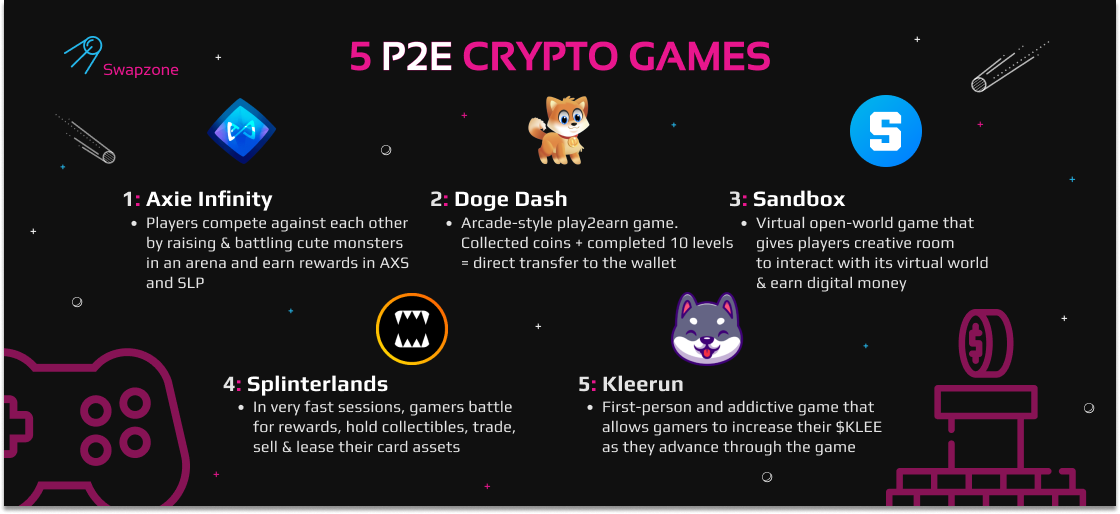Why Play-to-Earn Benefits Are Transforming the Means You Play and Make
The introduction of play-to-earn versions indicates a noteworthy shift in the video gaming landscape, welcoming gamers to discover not only the home entertainment value of video games yet additionally their potential as income-generating platforms. Understanding these dynamics elevates pertinent questions regarding the future of video gaming and the effects for both gamers and programmers alike.
Emergence of Play-to-Earn Models
In recent years, the gaming industry has witnessed a significant change with the development of play-to-earn designs, essentially changing how players involve with electronic settings. This ingenious technique enables players to acquire tangible rewards via their in-game tasks, producing a shift from conventional gaming standards where satisfaction and competitors were the primary motivations.
Play-to-earn versions utilize blockchain innovation and non-fungible tokens (NFTs) to provide gamers with possession of in-game assets, which can be traded or cost real-world money. Consequently, players are incentivized to invest effort and time into video games, cultivating a sense of firm and economic possibility. play to earn rewards. This shift has actually attracted a varied gamer base, consisting of those who might have previously checked out gaming as a simply recreational activity
A number of platforms have actually arised, showcasing effective executions of this model, such as Axie Infinity and Decentraland. These systems have not just created considerable revenue yet also triggered conversations around the sustainability and values of such financial systems. As play-to-earn versions remain to evolve, they guarantee to redefine the connection in between gamers, developers, and the wider digital economic situation, leading the way for a brand-new age in pc gaming.
Advantages for Players
As players involve with play-to-earn versions, they unlock a variety of benefits that expand beyond mere enjoyment. Unlike typical gaming, where players spend time and money without tangible returns, play-to-earn systems allow players to gain copyright or in-game possessions that can be converted to real-world value.
Additionally, play-to-earn versions advertise community building amongst gamers. Players often team up to achieve common goals, thus growing social connections that enhance the overall experience. This feeling of community can cause cooperative gameplay, where players share strategies and resources, improving both individual and group success.
Additionally, these versions can equalize accessibility to gaming by enabling gamers from diverse economic backgrounds to profit economically. By taking part in play-to-earn ecosystems, people can gain abilities and understanding concerning blockchain modern technology, further expanding their occupation chances in the expanding electronic economy. Ultimately, the advantages for players prolong well beyond gameplay, impacting their social, economic, and educational landscapes favorably.
Challenges in the Environment
While the play-to-earn ecosystem offers considerable opportunities, it is not without its obstacles. One significant problem is the volatility of in-game money and properties, which can result in uncertain earnings for players. Variations in value can prevent possible gamers who seek secure earnings streams - play to earn rewards. Additionally, the intricacies of blockchain innovation may perplex customers not familiar with digital money, producing barriers to access.
An additional difficulty is the threat of scams and illegal schemes that can plague the ecological community. Players may come across deceitful platforms assuring high benefits but inevitably resulting in monetary loss. Making sure trust fund and protection is crucial for the long-lasting feasibility of play-to-earn designs.
In addition, the environmental effect of blockchain gaming can not be forgotten. The power usage related to mining and deal handling increases moral questions about sustainability. Video game designers need to locate an equilibrium between fulfilling gamers and lessening eco-friendly footprints.
Last but not least, the governing landscape is still advancing, posturing potential dangers for developers and gamers alike. click resources Uncertain lawful frameworks can hinder innovation and restrict the development of play-to-earn communities. Resolving these obstacles is essential for recognizing the full potential of this transformative pc gaming paradigm.
The Role of Blockchain Technology
Blockchain modern technology acts as the foundation of the play-to-earn community, addressing much of the obstacles formerly described. By using decentralized ledgers, blockchain guarantees transparency and security in purchases. Gamers can with confidence make and trade in-game possessions, recognizing that possession is proven and exempt to manipulation.
.png)
Tokenization of assets plays a vital duty, providing players true ownership of their in-game things, which can be gotten, offered, or traded on different industries. This encourages a vivid additional market, where gamers can monetize their abilities and time invested in the video game.
Furthermore, blockchain technology enables interoperability in between different video games and systems, permitting players to carry their properties throughout various environments. This versatility not just enhances customer experience however also promotes a much more comprehensive gaming environment, ultimately reshaping the landscape of pc gaming and earning.
Future Trends in Video Gaming
The pc gaming industry is on the brink of a transformative development, driven by emerging innovations and shifting player assumptions. As play-to-earn versions gain traction, players are significantly seeking immersive experiences that mix home entertainment with substantial incentives. This shift is motivating programmers to innovate, focusing on producing appealing gameplay that fosters neighborhood and interaction.
One remarkable pattern is the integration of virtual reality (VR) and augmented fact (AR), enhancing the video gaming this hyperlink experience by supplying deeper immersion and interactive environments. Furthermore, developments in synthetic knowledge are allowing much more sophisticated non-player personalities (NPCs) and adaptive gameplay, tailoring experiences to individual player preferences.

Final Thought
In conclusion, the play-to-earn design is significantly transforming the gaming landscape by allowing gamers to derive real-world worth from their in-game activities. This paradigm shift not just enhances player involvement and financial investment however also raises obstacles that need to be dealt with to ensure sustainability within the ecosystem. As blockchain modern technology continues to facilitate possession of digital assets, the future of video gaming promises more advancement site web and opportunities for gamers across varied backgrounds.